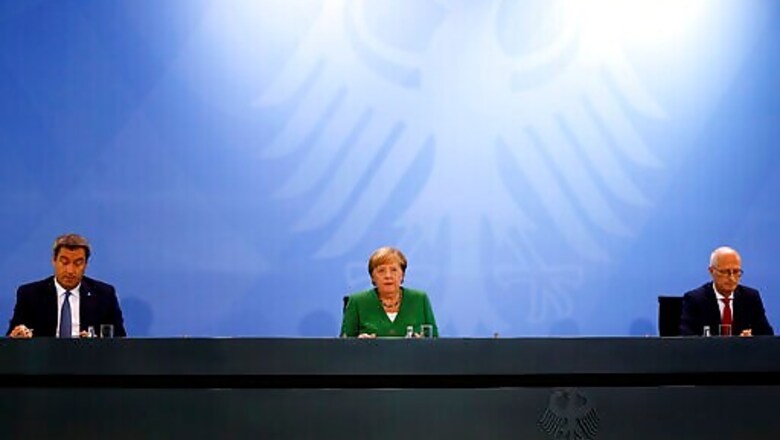
views
BERLIN: Most of Germany will impose a minimum fine of 50 euros ($59) for breaching mask-wearing rules as coronavirus infections rise again, Chancellor Angela Merkel said Thursday after a virtual meeting with the country’s state governors.
Officials also agreed to extend a ban on big events where social distancing and contact tracing cant be ensured until the end of December.
In decentralized Germany, imposing and loosening virus-related restrictions is a matter for the 16 state governments, so a patchwork of rules has emerged in recent months. Some areas have imposed no punishment for people who dont wear masks as required in public transport, shops and elsewhere while others have imposed high fines.
Merkel consulted Thursday with state governors on how to proceed. She said all except the eastern state of Saxony-Anhalt agreed on the minimum fine.
The chancellor also appealed to Germans not to travel to countries and regions deemed risk areas currently the United States and most of the world outside the European Union, as well as some regions inside the EU.
Wherever it is possible Germans should stay at home, she said.
Merkel announced that the current free coronavirus tests for travelers returning from non-risk areas would end on Sept. 15 when all German states have ended summer vacations and testing then should focus on nursing homes, hospitals, schools, preschools and migrant centers to prevent outbreaks.
People traveling to risk areas still must go into quarantine for 14 days upon their return to Germany unless they test negative but such tests can only be taken after five days of quarantine.
On Thursday, Germanys disease control center reported 1,507 new confirmed coronavirus cases, with the average age of people declining to 32 from about 50 at the start of the pandemic. Germany has been praised for its overall response to the virus, reporting 9,285 deaths, one-fourth of the virus death toll in Britain. Yet experts say all numbers undercount the true toll of the pandemic.
Last week, the number of new daily infections rose over 2,000 for the first time since April. During the height of the pandemic, Germany registered around 6,000 new cases a day.
In recent weeks, the virus has mostly been brought in by vacationers or spread locally at big family gatherings or weddings but Merkel and the state governors were not able to agree on a nationwide maximum limit for private celebrations.
However, Merkel promised the topic would remain on the agenda, especially as cooler fall weather moves family gatherings indoors.
Merkel and the state governors also agreed on five more days of paid sick leave this year for parents whose children have to stay home ill. She said state education ministers would work on harmonizing coronavirus hygiene rules across the country.
Most schools in Germany have gone back to regular classes but hundreds of schools have reported limited outbreaks and thousands of students and teachers have been sent into quarantine. The strategy is to avoid a national lockdown of schools again and to rein in school outbreaks locally.
–
Geir Moulson contributed reporting from Berlin.
Disclaimer: This post has been auto-published from an agency feed without any modifications to the text and has not been reviewed by an editor















Comments
0 comment